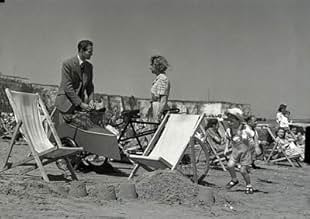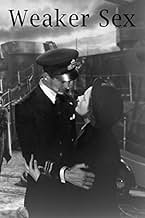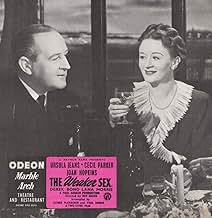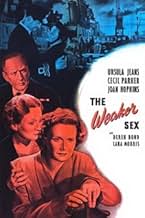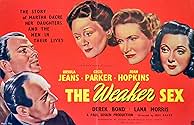Agrega una trama en tu idiomaA mother struggles to maintain normalcy at home as D-Day nears. With lodgers, absent children in the Navy, and no war job, she questions her choice to remain a housewife when her son's ship ... Leer todoA mother struggles to maintain normalcy at home as D-Day nears. With lodgers, absent children in the Navy, and no war job, she questions her choice to remain a housewife when her son's ship is damaged.A mother struggles to maintain normalcy at home as D-Day nears. With lodgers, absent children in the Navy, and no war job, she questions her choice to remain a housewife when her son's ship is damaged.
- Dirección
- Guionistas
- Elenco
- Premios
- 2 premios ganados en total
Basil Appleby
- Seaman Taylor
- (sin créditos)
Clement Attlee
- Self
- (material de archivo)
- (sin créditos)
Dorothy Bramhall
- Mrs. Maling
- (sin créditos)
Winston Churchill
- Self
- (material de archivo)
- (sin créditos)
Helen Goss
- Woman in Silk Stockings Queue
- (sin créditos)
Opiniones destacadas
I found the title of this rather classy wartime drama a bit misleading. Though it is told from the perspective of the widowed "Martha" (Ursula Jeans) and focusses on the stay at home elements of fighting during WWII - there isn't really anything weak about her dedication to her duties; nor of those of her counterparts. She plays her character with poignancy, dealing with the day-to-day trials and tribulations reconciling her work and her home - in which she billets RN commander "Geoffrey" (Cecil Parker) and sailor "Roddy" whilst her own two children are away serving. From a narrative perspective it climaxes with the D-Day landings and, intercut with War Office actuality, conveys a genuine sense of the fraught anticipation of those at home. Once the war has been won, the story rather peters out - a few fun jibes at the pains of rationing, and that most British of all things - the queue; and there is a degree of stoic, stiff upper lip-ness about the attitudes that makes the characterisations plausible and engaging, but it does slip a little into melodrama. There are a few welcome cameos from Thora Hird as their housekeeper (and, briefly, from Bill Owen with whom she starred in "Last of the Summer Wine" some 60-odd years later) and Kynaston Reeves. The story isn't all plain sailing: grim reality raises it's ugly head now and again, but that is handled subtly and isn't dwindled upon - helping the proceedings march along at a decent pace. I expect this went down well with audiences in 1948 - it's good.
Cheap-looking, studio-bound and obviously based on a play, but it looks good and is to be cherished as a very rare film lead for the charming Ursula Jeans.
This is what the war years British film industry excelled at. Ursula Jeans and Cecil Parker are a widow and friend of the late husband and her assorted adult children and relatives. The action of the film starts with Mrs. Dacre (Jeans) being given a fresh hen by a random soldier-which might be stolen. Parker is seen vacuuming the floor. War has switched their roles. Their growing friendship is nice to watch. Mrs. Dacre's sister is directly involved in the war so has the luxury of a free uniform, and they frequently clash. A son and daughter are in uniform too. The small issues set the restrained tone, not unlike Mrs. Miniver and Since You Went Away. But inevitably the war and DDay inflict a series of tragic events onto the people connected to Mrs. Dacre.
Now that the last of this generation is down to a few, films such as these will become more important as a cultural record.
If you have any interest in home front history, you'll enjoy this. I found it remarkably moving. The action sequences are terrific and the sets help to remind us how we live in relative luxury compared to life during wartime.
Definitely recommend.
Now that the last of this generation is down to a few, films such as these will become more important as a cultural record.
If you have any interest in home front history, you'll enjoy this. I found it remarkably moving. The action sequences are terrific and the sets help to remind us how we live in relative luxury compared to life during wartime.
Definitely recommend.
This is rather a strange film with an even stranger title.The film has a substantial amount of newsreel film intercut with the drama.Also there are newspaper headlines shown often when they seem to be of little dramatic point.Cecil Parker and Thora Bird steal the acting honours.I do wonder what contemporary audiences would have made of this film.Particularly being reminded of the austerity that everyone was having to suffer.Films like this were far better made during the war.
This small scale English movie was beautifully crafted by talented hands behind & before the camera. Notably, cinematographer Erwin Hillier, (whose b & w night scenes were beautifully composed and lit here), and a familiar and likable cast headed by Ursula Jeans and Cecil Parker added to this ironically titled film. Set around the central event of D-Day preparations and the aftermath of all the concentrated activity on the war, it demonstrated the emotional ripples on such events throughout the lives of the characters, centering on the household of Jeans, her children, and the military service personnel who come in and out of their lives as boarders during the war.
While some might dismiss this as a trite movie about inconsequential people in a great turning point in history, the strength of this film is that detailed, largely domestic focus on the wartime anxieties, hard work and, of course, usually stoic British attitudes toward the war. This was heightened by the skilled filmmakers' ability to show the emotional ebbs and tides surging beneath the seemingly placid surface of the characters' lives. One illustration of this was the work of character lead Cecil Parker as a middle aged naval officer and widow Ursula Jeans as they quietly realized that their platonic friendship was deeper than either had fully realized.
While some might dismiss this as a trite movie about inconsequential people in a great turning point in history, the strength of this film is that detailed, largely domestic focus on the wartime anxieties, hard work and, of course, usually stoic British attitudes toward the war. This was heightened by the skilled filmmakers' ability to show the emotional ebbs and tides surging beneath the seemingly placid surface of the characters' lives. One illustration of this was the work of character lead Cecil Parker as a middle aged naval officer and widow Ursula Jeans as they quietly realized that their platonic friendship was deeper than either had fully realized.
¿Sabías que…?
- TriviaMartha Dacre quotes from "Life a duty" by Ellen Sturgis Hooper (February 17, 1812 - November 3, 1848): "I slept, and dreamed that life was Beauty; / I woke, and found that life was Duty."
- Créditos curiososOpening credits prologue: The story of Martha Dacre and her family covered the period of four years from D-Day onwards . . .
It might have been your story.
- ConexionesReferenced in The Good Life: The Weaker Sex? (1975)
- Bandas sonorasThese Foolish Things (Remind Me of You)
(uncredited)
Written (1936) by Eric Maschwitz and Jack Strachey
Sung by Cecil Parker in opening scene
Selecciones populares
Inicia sesión para calificar y agrega a la lista de videos para obtener recomendaciones personalizadas
Detalles
- Tiempo de ejecución
- 1h 24min(84 min)
- Color
- Relación de aspecto
- 1.37 : 1
Contribuir a esta página
Sugiere una edición o agrega el contenido que falta

